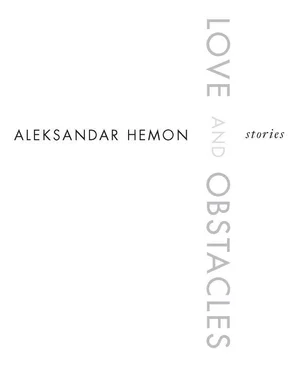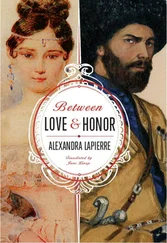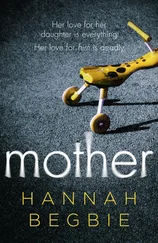Aleksandar Hemon - Love and Obstacles
Здесь есть возможность читать онлайн «Aleksandar Hemon - Love and Obstacles» весь текст электронной книги совершенно бесплатно (целиком полную версию без сокращений). В некоторых случаях можно слушать аудио, скачать через торрент в формате fb2 и присутствует краткое содержание. Издательство: Penguin USA, Inc., Жанр: Старинная литература, на английском языке. Описание произведения, (предисловие) а так же отзывы посетителей доступны на портале библиотеки ЛибКат.
- Название:Love and Obstacles
- Автор:
- Издательство:Penguin USA, Inc.
- Жанр:
- Год:неизвестен
- ISBN:нет данных
- Рейтинг книги:5 / 5. Голосов: 1
-
Избранное:Добавить в избранное
- Отзывы:
-
Ваша оценка:
- 100
- 1
- 2
- 3
- 4
- 5
Love and Obstacles: краткое содержание, описание и аннотация
Предлагаем к чтению аннотацию, описание, краткое содержание или предисловие (зависит от того, что написал сам автор книги «Love and Obstacles»). Если вы не нашли необходимую информацию о книге — напишите в комментариях, мы постараемся отыскать её.
Love and Obstacles — читать онлайн бесплатно полную книгу (весь текст) целиком
Ниже представлен текст книги, разбитый по страницам. Система сохранения места последней прочитанной страницы, позволяет с удобством читать онлайн бесплатно книгу «Love and Obstacles», без необходимости каждый раз заново искать на чём Вы остановились. Поставьте закладку, и сможете в любой момент перейти на страницу, на которой закончили чтение.
Интервал:
Закладка:
Szmura’s Room
He stands at Szmura’s door, his left hand suspended in midair, reluctant to knock. Flanked by two suitcases, one of which is held together by a frayed rope, he palpitates, out of shape and undernourished. He is clad in a dark coat, the collar striated with lint and dandruff, the sleeves tragicomically short, exposing his dirt-rimmed shirt cuffs. When Mike Szmura opens the door, wearing nothing but pajama bottoms and a front of frightening chest hair, Bogdan utters his lines in stuttering English. “Right off the boat,” Szmura says in a maliciously nasal voice. He steps aside to let our boy enter the apartment, the roped suitcase banging at his ankles, the other one smashing against Szmura’s knee.
At least, that is how Szmura described it to us later, exhibiting the obscure alleged bruise on his knobby knee. We had interrupted our poker game (my two jacks were waiting to lure Szmura and Pumpek into surrendering their weekly income) so that Szmura could use his meager narrative talents to depict and embellish Bogdan’s arrival. The other players, Pumpek and a couple of realtor buddies he brought along to serve as suckers, were unabashedly American and uninterested, and they impatiently waited for Szmura to finish so the game could go on. But in a likely attempt to distract me from the game, Szmura added, “He is from your lousy country, Basnia, whatever you call it.” My two jacks promptly responded to the insult, and by the time I had raked in the loot with both hands, I had forgotten all about the forlorn foreigner at Szmura’s door.
At subsequent poker games I learned more. Szmura attempted to entertain us with a repertoire of dumb-foreigner acts and bad-accent jokes featuring Bogdan, and from these performances, I gathered that Bogdan was much like me, an oddity: a Ukrainian from Bosnia, although, unlike me, he was not from Sarajevo. Szmura had no interest in internal Bosnian cultural differences and presupposed that there was a deep, essential kinship between us, which is to say that by mocking Bogdan he was making me the target. I preferred taking his money to taking exception—he had reached the point of writing promissory notes, and I kept them, as if they were love notes, even after he’d made good on them.
Bogdan had been delivered to Chicago through some lamentably narrow refugee channel—a Uke priest knew a Uke priest who knew about a cheap room at Szmura’s. The size of a closet, the room was in the apartment that Szmura rented from his ex-girlfriend’s grandmother, who blissfully chose to ignore the fact that Szmura had permanently and irreversibly dumped the apple of her eye shortly after banging her.
As small as the room was, it echoed with emptiness. Bogdan parked his suitcases flat in the windowless corner; took a sheet and a blanket out of the unroped one and spread them under the murky window—unequipped with mattress or duvet, this was where he would sleep. The room resembled an installation in a vacuous art gallery, the reflection of the ceiling bulb on the wood floor intended to signify the false surface of existence, the felled suitcases embodying the transitory nature of life—or more specifically, the life of the subject, shrimped up in the corner against a bare, mispainted wall. Naturally, it was all very funny. During another poker game at Szmura’s (which I missed), everyone filed into Bogdan’s chamber and found the installation uproariously amusing: they guffawed to the verge of retching and fell to the existential floor, while Bogdan sat in his corner, perplexed by all the wisecracks about his artsyfartsiness.
He did eventually get an official tour of the apartment—an introduction to the Szmura world and its impenetrable mysteries. In the living room, with a sweeping movement of his hand, Szmura offered his furniture to Bogdan’s eye: the claret velvet armchair facing a pseudo-Oriental coffee table, all Chinese curves and Japanese angles; the crimson sofa, with its wide U shape and stern, flat armrests—for some reason, Szmura referred to it as “the Puerto Rican.” Bogdan was allowed to peruse the Puerto Rican when Szmura was absent, he was told; otherwise the armchair was available. Then Bogdan had to inspect the collection of objects on the mantelpiece, which consisted of an upright bullet-casing that Szmura’s venerable father had brought back from Vietnam; a glass ashtray full of foreign coins (mainly kopecks and zloty); a bottle of Grolsch beer (“Be very careful,” Szmura said, “ ’cause this bottle is from Florida”); and a figurine of a cow, complete with a swollen udder, that was left unmentioned. Bogdan also glanced out the window, although it looked over the same alley as did the window in his room. There was nothing to see, of course, except a garage door inching downward like a stage curtain, and a few fallen deciduous leaves slipping inside before it closed.
In the bathroom, Bogdan was shown the hooks that Szmura used to hang his upper-body (navy blue) and lower-body (azure) towels and his carmine silk robe with a fire-breathing dragon on the back—Bogdan was assigned the fourth hook. He was also told that he must make a habit of lifting the toilet seat, should he put it down for the big dookie, and that he must never shave or piss in the shower. Finally, Szmura pushed a little jar into his face, its bottom lined with yellowish mites—this was where Szmura collected the wormy stuff from his nose pores.
In the kitchen, Bogdan was warned that the mug inscribed MИКОЛА, its chipped brim adorned with a traditional Ukrainian pattern, was never to be touched. The fridge contained a bowl of intensely red vine tomatoes (“They make the blood strong”), along with Szmura’s black dress shoes on a tray; a plate of rotting shrimp; and a jar of Vaseline, which Bogdan could not fail to conclude was deployed for some form of self-abuse. He and Szmura did not dwell long over the contents of the pantry. Suffice it to mention a large number of Shake ’n Bake boxes stacked on the bottom shelf, and an impressive collection of soup cans lined up in alphabetical order on the top two shelves: Shelf No. 1, from Asparagus to Minestrone; Shelf No. 2, from Mushroom to Zucchini. The soup was not for Bogdan, Szmura declared. Were he ever to open a can, he would have to replenish the collection the very same day. Concluding the tour, Szmura flung open the door of his own bedroom, and exposed briefly a darkness into which the light cut a lambent rhomboid. Bogdan was never to enter this room, not even if invited. “Think of it,” Szmura said, “as a minefield.”
Szmura, however, would often freely enter Bogdan’s room, opening the door violently. He would launch into monolithic monologues welcoming Bogdan to this great country, which had been built by immigrants, including Szmura’s own grandparents, who’d had to work hard to pull themselves up by the bootstraps and now had a condo in Orlando—which was great because it meant that there was an opportunity for everybody in this country, even a fuckface. D.P. like Bogdan. Bogdan could tell that Szmura enjoyed these speeches; he would stroke the hair coppice on his forearms as he spoke, as if petting himself.
Szmura’s manner of door-opening was closely linked to his fantasies of becoming an FBI agent: he was an intern at a law office and watched COPS regularly, all in preparation for the FBI entrance exam, which he would take as soon as he graduated from the University of Illinois law school. Bogdan was made privy to Szmura’s FBI fantasies after he unwisely agreed to a demonstration of a submission technique. He found himself on the floor, with Szmura’s knee pressing against his jugular, his elbow and shoulder about to pop. “I could kill you, if I wanted to,” Szmura said matter-of-factly before he let him go.
Читать дальшеИнтервал:
Закладка:
Похожие книги на «Love and Obstacles»
Представляем Вашему вниманию похожие книги на «Love and Obstacles» списком для выбора. Мы отобрали схожую по названию и смыслу литературу в надежде предоставить читателям больше вариантов отыскать новые, интересные, ещё непрочитанные произведения.
Обсуждение, отзывы о книге «Love and Obstacles» и просто собственные мнения читателей. Оставьте ваши комментарии, напишите, что Вы думаете о произведении, его смысле или главных героях. Укажите что конкретно понравилось, а что нет, и почему Вы так считаете.












